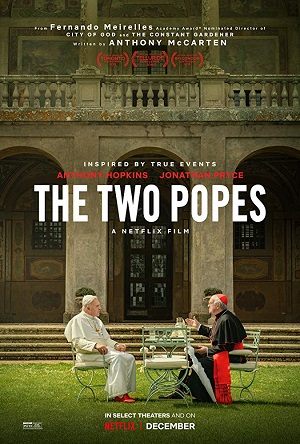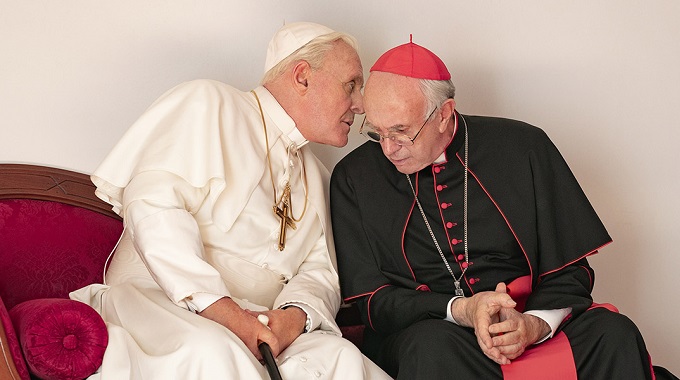 |
CAST
JONATHAN PRYCE
CRISTINA BANEGAS
SIDNEY COLE
GERMAN DE SILVA
LISANDRO FIKS
LUIS GNECCO
ANTHONY HOPKINS
JUAN MINUJIN
RENATO SCARPA
MARIA UCEDO
WRITTEN BY
ANTHONY McCARTEN
PRODUCED BY
JONATHAN EIRICH
DAN LIN
TRACEY SEAWARD
DIRECTED BY
FERNANDO MEIRELLES
GENRE
COMEDY
DRAMA
HISTORY
RATED
AUS:M
UK:12A
USA:PG-13
RUNNING TIME
125 MIN
|
|
 |
A lapsed Catholic’s lament on the state of the Church as symbolised by its leaders old and new, what The Two Popes lacks in authenticity it makes up in its relevant portrayal of a religion plagued by scandal and ideological warfare.
Biopics are not documentaries and should never be treated as such. Yet that doesn’t mean kernels of truth can’t be found in these dramatic recreations of historical events. In the case of The Two Popes, these truths are scattered throughout a biopic that is based on a false premise: the meeting between Pope Benedict, aka Cardinal Ratzinger (Anthony Hopkins) and Pope Francis, aka Cardinal Jorge Bergoglio (Jonathan Pryce), in which Ratzinger announced his decision to step away from the Chair of Peter.
The screenwriter of The Two Popes is Anthony McCarten, who of late has become the go to guy for all matter of biopic, ranging from The Theory of Everything to Bohemian Rhapsody. As the latter exemplifies, McCarten has no qualms in distorting truths or timelines in order to create an engaging and entertaining film, and nor should he. The best biopics often deal in manipulation, for that is exactly the currency that cinema runs on. Every laugh in a comedy, every scare in a horror movie, and every weepy scene in a drama, is carefully constructed and executed to elicit a response.
For McCarten, The Two Popes is his commentary on a religion which he was raised in but has since strayed away from. Yet even devout Catholics (this critic among them) can acknowledge the many truths spoken in McCarten’s text, that namely paints an institution riddled with self-inflicted wounds so deep that the Pope himself could not bear to deal with such a burden.
Just as important is the ideological warfare within the Church, as personified here in Ratzinger’s conservative dogmatic approach, and Bergoglio’s more progressive, street smart style. Again, ignorance to the facts are needed here. It is true that Ratzinger is more of a traditionalist to Bergoglio, yet to state that one of the key figureheads in the Vatican II reformations of the 1960s is a heart pounding conservative is not accurate. But it does make for an interesting dynamic which McCarten and director Fernando Meirelles (City of God) exploit to make for great drama.
Speaking of Meirelles, he does a great job in taking McCarten’s play into the corridors of Rome, to the streets of Argentina, and worlds in between. Flashbacks to Bergoglio’s time as a young priest, especially his mishandling of the Church’s relations with the fascist Argentinian governments of the 1960s, is handled with artistry and clarity, and adds to, rather than muddles, this story of holy men with the weight of a billion souls on their shoulders.
As a result, Bergoglio rather than Ratzinger is a much bigger and more sympathetic point of emphasis. After all, in McCarten’s eyes Pope Francis is the progressive saviour that the Church has been looking for, and Meirelles more than emphasises this opinion. Jonathan Pryce immerses himself in the role of Bergoglio. In top of bearing a strong resemblance to Bergoglio, Pryce expertly portrays the voice, cadence, body language, and internal moral struggle of perhaps the most recognisable man in the world. It is as impressive a biopic performance as there is, and likely will ever be.
Hopkins turn as Ratzinger, also fine, is too often overwhelmed by the quirks and eccentricities of the actor portraying him, with Hopkins not able to shake off his strong persona and the legacy of iconic performances that comes with it.
And so it goes with The Two Popes, a biopic that is more facade than fact, yet never the less a fascinating exploration into the power dynamics – political, spiritual, emotional – that haunts the Catholic Church, and the men bequest by God to represent it.
|
|
|
|
|
|
APPROVED CRITIC AT
 |
|
APPROVED CRITIC AT
 |
|
|
|